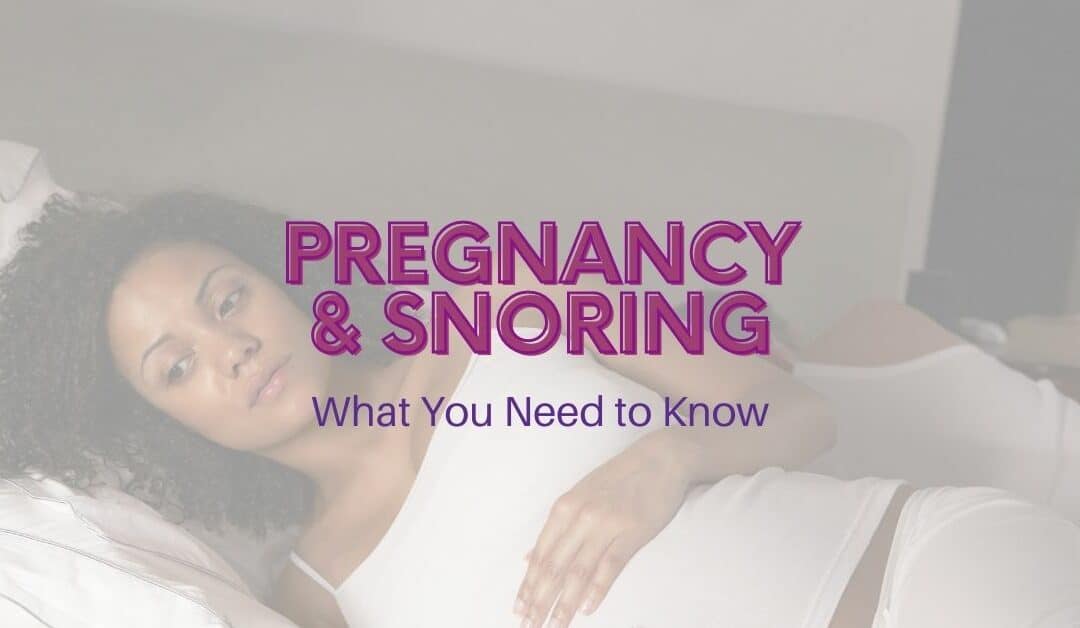During pregnancy, many women experience snoring for the first time in their lives. Nasal congestion often causes snoring. As the body produces more estrogen and progesterone during pregnancy, these hormones exacerbate nasal congestion. While snoring is often not a cause for concern, it can sometimes be symptomatic of a more serious medical disorder. Let’s look at the relationship between pregnancy and snoring and when you should seek treatment.
Pregnancy & Sleep Apnea
Statistics show that around 25 percent of pregnant women experience obstructive sleep apnea (OSA), which causes snoring and interrupted breathing during sleep.
OSA can be dangerous for both the mother and baby, so it is essential to seek treatment if you think you may be affected.
Central sleep apnea (CSA) is a less common form of sleep apnea that occurs when the brain fails to send the correct signals to the muscles that control breathing.
This lack of communication between the throat muscles and the brain can cause shallow breathing or even periods of no breathing. CSA is also dangerous for both mother and baby and needs treatment if diagnosed.
Complex sleep apnea occurs when both physical and mental symptoms may cause your apnea symptoms. No matter which type of apnea you suffer from, it is necessary to seek medical treatment if sleep apnea causes your snoring.
Pregnancy Changes that Cause Snoring
Several physiological changes occur during pregnancy that can cause snoring. The most common reasons are an increase in the production of estrogen and progesterone and nasal congestion from swelling due to increased blood flow.
Other causes can include:
– An enlarged thyroid (goiter)
– Sleep apnea
– Enlarged tonsils or adenoids
Pregnancy Snoring vs. Dangerous Snoring
Pregnancy and snoring are often related, but snoring can also be symptomatic of a more serious medical disorder. If you snore during pregnancy and notice other troubling symptoms, you should see a doctor.
For most women, snoring is simply a result of nasal congestion and will fade away after the baby’s birth. However, it is essential to be aware of the dangers associated with obstructive sleep apnea so that you can get treatment if necessary.
What is Obstructive Sleep Apnea?
Obstructive sleep apnea (OSA) happens when your airway throat structures collapse, making it harder to breathe. The difficulty breathing often results in episodes of not breathing at all, called “apneas.”
The number and frequency of apneas determine how much you need medical treatment. Sleep apnea can lead to several dangerous health consequences, including high blood pressure, heart disease, and stroke.
If you snore during pregnancy, see an ENT doctor if you face other symptoms such as:
- shortness of breath
- snorting or gasping for air
- excessive daytime sleepiness
These symptoms can be signs of sleep apnea, and it is vital to get treatment before the condition worsens.
Treatments for Obstructive Sleep Apnea (OSA)
Your partner kicking you repeatedly as you snore does not count as a medical treatment for OSA. However, some treatments work well and reduce the dangers associated with sleep apneas. These include:
CPAP Machine
A CPAP is a machine that delivers a steady stream of air through a mask you wear during sleep. The CPAP sends forced air pressure to keep your airway open and prevent apneas.
Inspire
Inspire is a small FDA-approved device planted in a same-day procedure that opens your airway at night when you sleep. It stimulates a nerve causing your throat muscles to move out of the way when you breathe.
Surgery
Surgery can help remove excess tissue in the throat that can cause obstruction or widen the airway.
Diet and Lifestyle Changes
Pregnancy’s extra weight and blood volume often make your airway smaller due to swelling and excess weight. Reducing the rate of pregnancy weight gain, quitting smoking, and avoiding alcohol can all help reduce snoring and the risk of developing OSA.
However, if you are pregnant and snoring, it is crucial to get an evaluation for sleep apnea. Sleep apnea can be dangerous for both the mother and baby, so it is vital to seek treatment if you have symptoms.
What is a Sleep Study?
A sleep study is a test used to diagnose obstructive sleep apnea. It involves spending one night in a sleep lab, where doctors monitor you as you sleep. A sleep study helps determine how severe your snoring is and whether you have apneas.
If you snore during pregnancy and are concerned about the potential for developing obstructive sleep apnea, ask your doctor if a sleep study is right for you. Getting treatment early can help protect your health and your baby’s health.
If you snore during pregnancy and are concerned about obstructive sleep apnea, see an ENT doctor for diagnosis and treatment. Treatment for OSA is effective and can improve your overall health.
We Can Help
At Enticare, our board-certified sleep specialists work with you to find the root cause of your snoring. We employ innovative solutions to give you a good night’s rest. Your sleep is even more crucial for your health and your baby’s growth during pregnancy. We can help you find the answer that’s best for you and your baby. Find out what it’s like to feel energetic again when you wake up. Contact us today to start finding out how to solve your sleep issues

